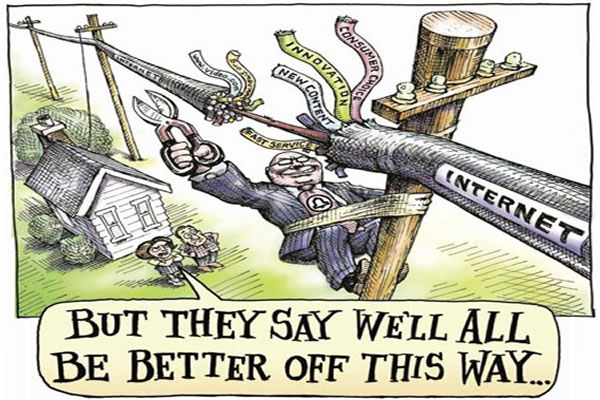Beginning of the end of net neutrality on the Internet?

Surprisingly, but apparently, the news of a recent event that could completely change the appearance of the Internet in the very near future, which we know today, went unnoticed on Habré. And to damage the seemingly unshakable principles laid down from the very beginning by its creators.
It is about the abolition of net neutrality . And this event did not happen at all in Russia, where net neutrality never happened (for example, many of our operators have already distributed the same Yandex-maps traffic for free, giving them an obvious advantage over the same Google Maps). Not. It happened two days ago in the USA. A country that is fighting for freedom and democracy the most.
')
On January 14, the US Federal Communications Agency (FCC), in an attempt to influence non-compliance with net neutrality by major American providers, was faced with the fact that the US Court of Appeal denied them this right. The refusal was motivated by the fact that, in fact, the Internet is not such an indispensable resource in need of such kind of regulation, such as electricity or telephony.
Despite the fact that the Verizon, Comcast and AT & T providers that won as a result of the case stated that they are not going to take any action that would affect the freedom of the Internet, we must understand that the gun hanging on the stage should somehow fire in one of the acts of theatrical play.
What can it threaten?

Today, the site of a small company with very modest incomes with the right technical approach can work and load as quickly as the website of a multi-billion dollar corporation. But things can easily change after the providers have the right to control the priority of traffic. There may be a situation when the tariffs for using the Internet will include a list of sites and services available for use at this tariff. Moreover, in the basic package, which will be connected completely free of charge, all the “monsters” of today's market will be presented - companies that, most likely, will pay providers themselves for the opportunity to provide the user with their services. Thus, large companies will have a huge advantage over the rest, which simply will not be able to pay. And tomorrow, when you want to share the news of your startup or your Facebook homepage, you may be confronted with the fact that most of those who try to follow your link will simply not be paid for this opportunity.
And, of course, you can not cite the example of Skype. Mobile operators have long dreamed of limiting its operation within their networks in favor of voice traffic. Now they have this opportunity.
Source: https://habr.com/ru/post/209380/
All Articles